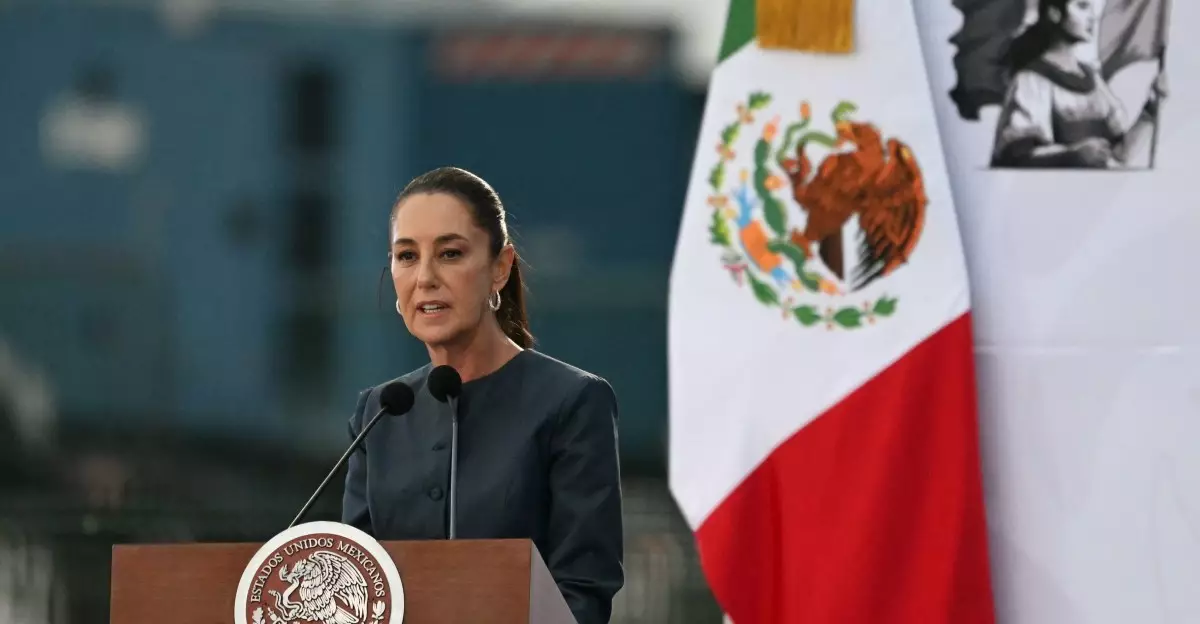The clash over geographical identity is not merely a question of semantics; it embodies national pride and autonomy. Recent events have escalated this narrative, notably through a controversial name change initiated by former President Donald Trump, which designated the Gulf of Mexico as the “Gulf of America” for U.S. users on digital platforms. This move appears to be part of a broader agenda to assert American dominance, even in areas where international and regional sensitivities govern naming conventions. Mexican President Claudia Sheinbaum’s reaction to this unfolding situation exemplifies the pushback against such unilateral changes that disregard the historical and cultural significance of territorial nomenclature.
Sheinbaum’s Legal Action Against Google
On a key date in early 2023, President Sheinbaum announced a lawsuit against Google, prompting discussions about international law, sovereignty, and corporate responsibility. The Mexican government is challenging Google for adopting the “Gulf of America” label for users outside Mexico while retaining the original name for its domestic audience. This discrepancy raises questions about how international corporations interact with state directives and the extent to which they can invoke local laws to shape a global narrative. By suing Google, Sheinbaum is not only fighting for respect for Mexico’s sovereignty but also emphasizing that no government has the authority to mandate changes to the names of shared or international bodies of water.
International Implications and a Nationalistic Response
Sheinbaum’s assertion conveys a strong message: while the U.S. government may dictate policy within its borders, it cannot unilaterally alter identities that span across international boundaries. The geographical nomenclature is embedded within complex histories and relationships among nations, and any attempt to alter this should be approached with caution and respect. By emphasizing that the name change can only apply to U.S. territory—similar to how a mountain or city can be renamed within national borders—Sheinbaum anchored her argument on principles of international law and mutual respect.
This legal confrontation is also a reflection of broader nationalistic sentiments that are stirring within Mexico. The feeling of encroachment on cultural identity and territorial dignity resonates with many Mexicans, and Sheinbaum’s decisive stance could galvanize public sentiment against perceived overreach from the U.S. The implications for U.S.-Mexico relations are profound; such confrontations could either foster a constructive dialogue about mutual respect or deepen rifts based on historical grievances that have often surfaced in cross-border dynamics.
Google’s Role and the Business of Names
While the legal and political ramifications are significant, one must also consider Google’s complicated position in the tech landscape. As one of the largest technology companies operating worldwide, its decisions carry weight that transcends regional boundaries. In changing the name displayed on its platforms, Google has not only complied with the Trump administration’s directives but also unwittingly positioned itself in the midst of this international dispute. In their defense, representatives state that decisions on how places are categorized can indeed reflect a political agenda, a scenario exacerbated by the sensitive nature of Trump’s legacy.
Moreover, the situation shines a light on how tech companies can influence public perception and cultural identities through mere algorithmic decisions. The case of Google’s name change serves as a reminder that technology companies wield considerable power over public information. The ease with which Google adapted its nomenclature highlights tech entities’ precarious place in political arenas where naming can evoke emotional reactions and nationalistic fervor.
The Significance of the Gulf Name Debate
The ongoing dispute surrounding the Gulf’s name encapsulates larger themes at play in contemporary geopolitics: the assertion of national identities, the complicity of corporate entities in political narratives, and the intrinsic value of historical recognition. The friction between Mexico and the United States during this time serves as an important reminder of past tensions, alluding to decades of complex relations affected by identity struggle, migration issues, and trade agreements. This moment may be as much about geographical labels as it is about reclaiming agency in a world increasingly dominated by technological oversight.
Ultimately, Sheinbaum’s defiance in the name of Mexican sovereignty transcends the courtroom; it resonates as a clarion call advocating for recognition, respect, and a fair representation of Mexico’s cultural narrative in spaces governed by powerful tech giants. This controversy sends a clear message, portraying that shifts in territorial identity—however digitally enacted—are far from trivial.


Leave a Reply